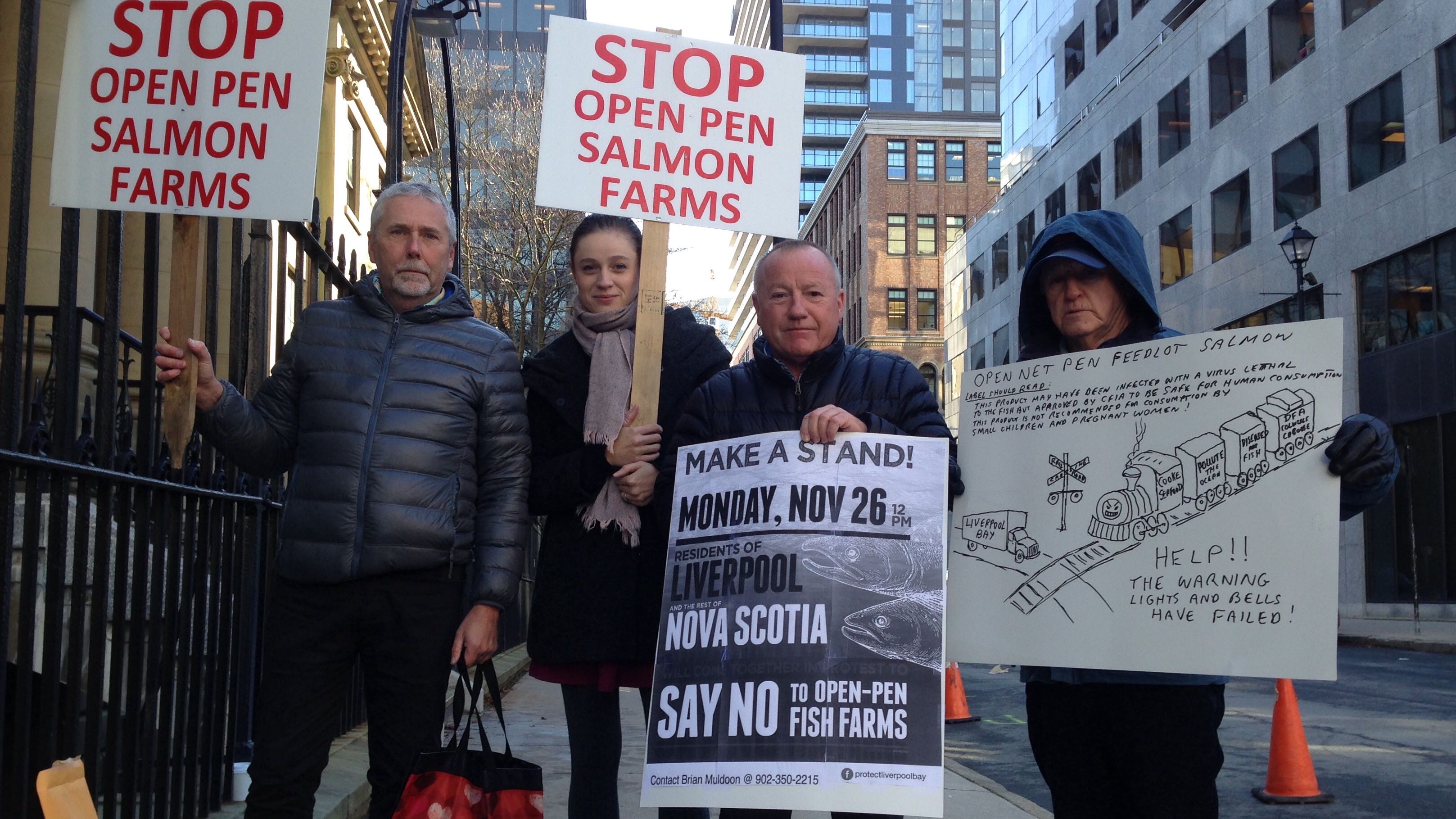Aquaculture
‘It’s all bad’: Opponents denounce expansion of fish farm in Liverpool Bay
Cooke Aquaculture looks to expand operations

caption
Protesters gather outside Province House on Nov. 26 to voice their opposition to proposed fish farms in Liverpool.As Cooke Aquaculture looks to expand its fish farming in Liverpool Bay, residents who oppose the project say the company is ignoring their concerns.
In September, the Nova Scotia government granted Kelly Cove Salmon, a subsidiary of Cooke Aquaculture, permission to look at new sites in the bay. The company has operated one site in the area since 2011, which employs 10 people.
Those opposed to the expansion have a number of concerns, including fish-waste pollution, the possibility of cage failures, the use of pesticides to control sea lice and potential negative impacts on sea creatures, like lobster.
“It’s all bad. It’s an environmental and fisheries disaster, wherever they go,” said Fred Giffin, one of the protesters outside Province House on Nov. 26. About 100 people attended a similar demonstration in Liverpool that day.
Giffin said he’s concerned with the company’s track record, including the use of illegal pesticides, diseased salmon, damaged cages and fish escapes.
Kim Masland, MLA for Queens County and a Liverpool resident, said the majority of constituents she’s spoken with have made their concerns clear.
“They’re looking at this expansion more as a threat, not an opportunity,” she said.
Residents are also worried about the economic impact on tourism and real estate, she said, pointing to a study from the Université Sainte-Anne outlining the environmental, economical and social concerns of local fishermen.
“We don’t know what the economic benefits of this expansion will be,” Masland said. “But we do know the economic benefits of our tourism industry and our lucrative lobster industry. And those are two things that, really, we cannot jeopardize.”
‘Due diligence’
Joel Richardson, vice-president of public relations for Cooke, said it’s too early to say how large the expansion might be. However, he said, the company is working with researchers, scientists and other marine professionals to determine the best location for any additional fish farms.
Cooke recently acquired a new vessel that treats fish for sea lice, without chemicals, by running them through through warm water, Richardson said. He also said treatments used by the company to control parasites are consistent with large-scale agricultural producers.
If the company submits an application to the province for new sites, it will be in the new year. After the application is submitted, it must be reviewed by the Nova Scotia Aquaculture Review Board.
“The work that we’re doing now, gathering feedback from the community and doing our own due diligence, looking at the research and science behind the potential siting, it’s just part of that process,” Richardson said.
Questions about the process
On Oct. 30, 174 people attended an open house-style meeting held by Cooke for residents to learn more about the project. Giffin said the company failed to answer questions or address concerns from community members.
“It’s just like beating your head against the wall,” he said.
“My concern is that the legitimate information gets back to the review board,” Masland said. “I think the process that was held is not what should have been held. I feel it should have been an open forum for people to actually ask questions.”
Richardson said residents can submit questions and concerns through a corporate website, noting that there’s only been a few submissions. All feedback will be forwarded to the review committee, which will hold an adjudicative hearing once Cooke completes the scoping process. Shortly before the hearing, members of the public will be allowed to submit written comments to the board for consideration.
Aquaculture regulations implemented in 2015 require applicants to conduct a scoping process, which is meant to facilitate communication and information-sharing between the company, the public and the regulatory board. As part of that process, Cooke is required to hold a public information session and to collect public input for submission to the review board.
According to an environmental law organization, aside from the requirement of a public information meeting, all other aspects of the scoping process are “to be determined by the minister.”
Under the regulations, it is unclear whether the findings of the scoping process will be made public once submitted to the Aquaculture Review Board.
In an interview with The Signal on Dec. 4, Fisheries and Aquaculture Minister Keith Colwell said while Cooke is not obligated to publicly release the findings of the scoping process, they will be discussed during the hearing, which will be recorded and open to the public. Community members with specific complaints or concerns may make oral or written submissions to the review board at that time.
Masland believes a lack of transparency causes a breach of trust between residents, the provincial government and Cooke.
“If we’re going to ask communities to be a host community of these farms, we need to make sure the information, all of the information, is coming back to the people and that the people who live in the county have an option to make a decision,” she said.
Editor's Note
The comment from the aquaculture minister was added after this story was first published.

